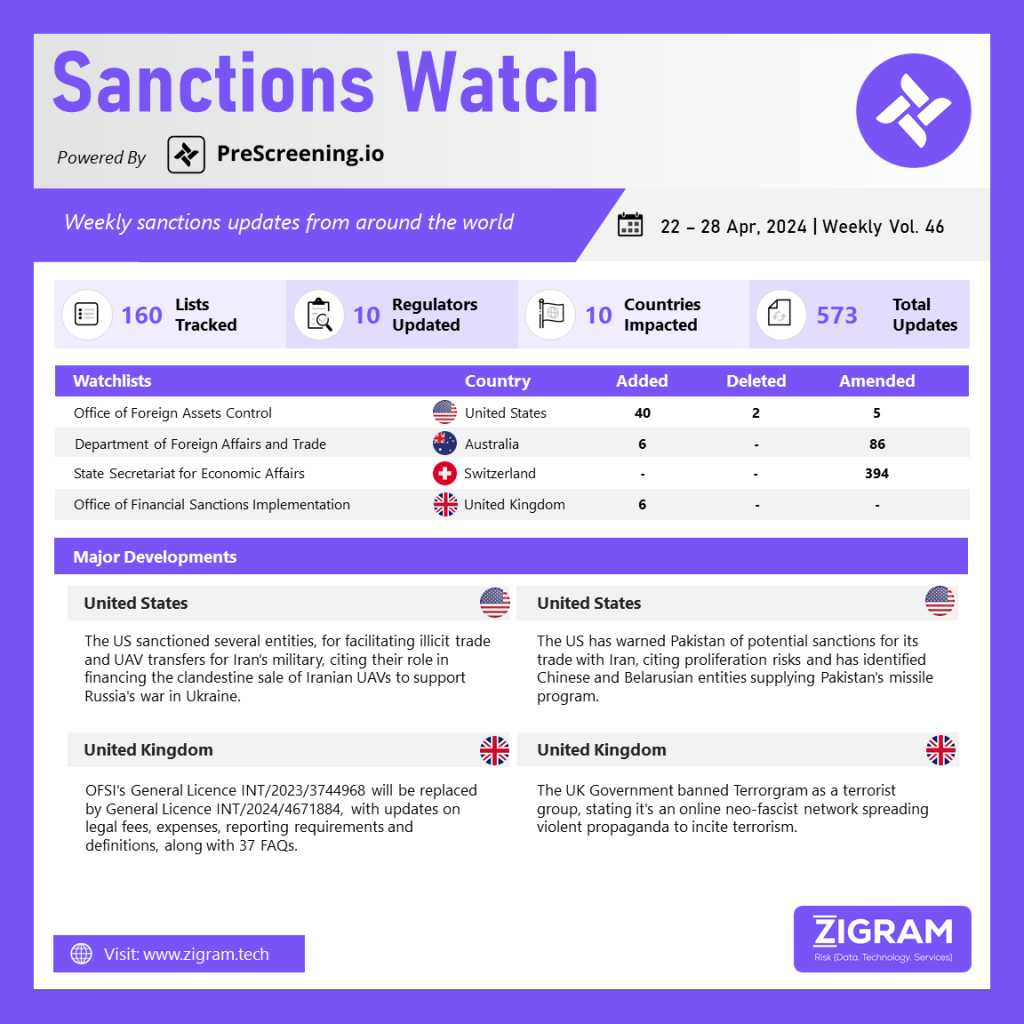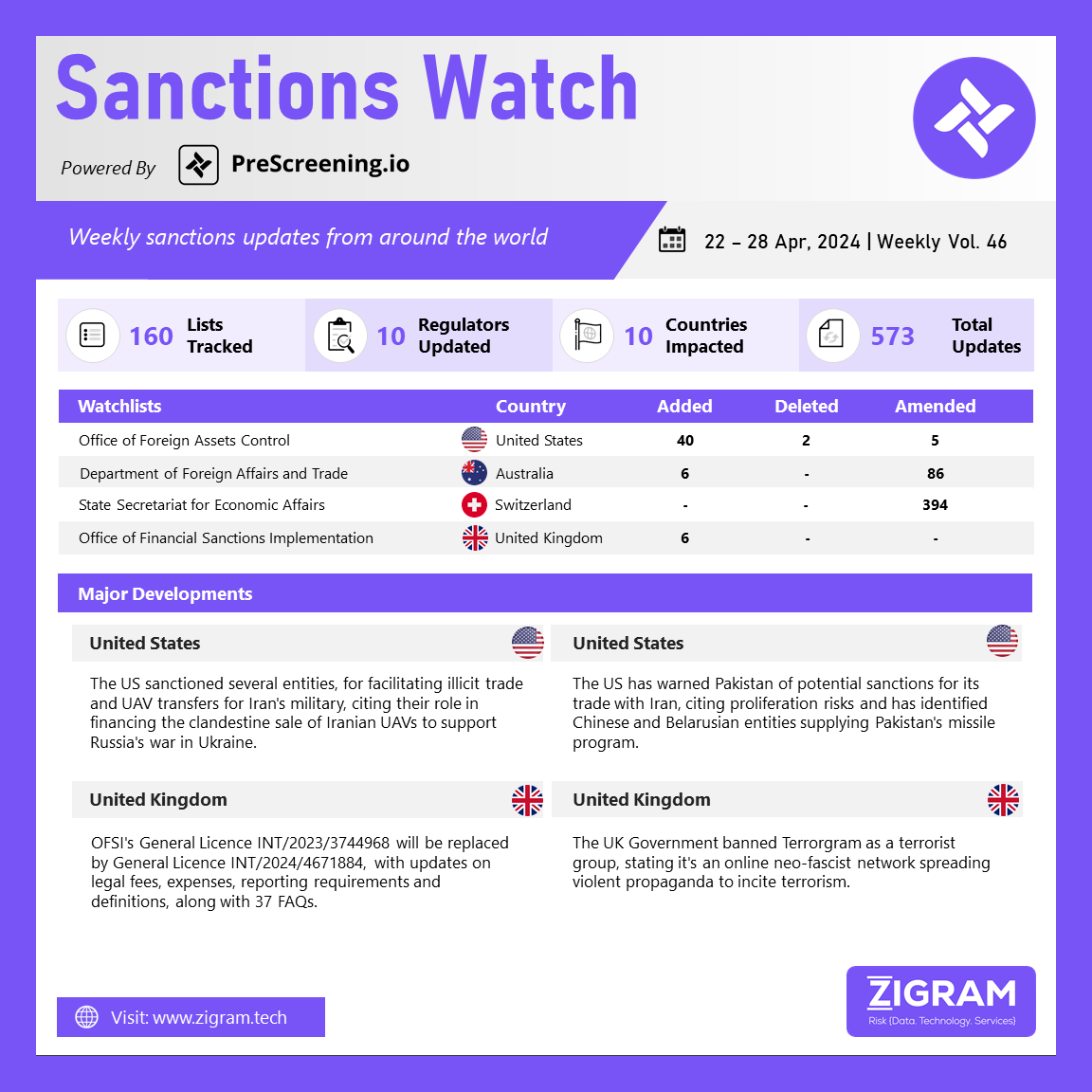Published Date:
In the latest edition of our Sanctions Watch weekly digest, we present significant updates on sanction watchlists and regulatory developments.
The United States imposed sanctions on Thursday against over a dozen entities, including three from India, for their involvement in facilitating illicit trade and transfers of unmanned aerial vehicles (UAVs) on behalf of the Iranian military. The US Department of Treasury stated that these entities played a central role in financing the clandestine sale of Iranian UAVs to support Russia’s war in Ukraine. Sahara Thunder was identified as the main front company overseeing Iran’s commercial activities in this regard. The three India-based companies sanctioned for supporting Sahara Thunder are Zen Shipping, Port India Private Limited and Sea Art Ship Management (OPC) Private Limited. The Treasury highlighted Sahara Thunder’s reliance on a vast shipping network for selling and shipping Iranian commodities on behalf of Iran’s Ministry of Defence and Armed Forces Logistics to various destinations, including China, Russia and Venezuela.
The United States issued a warning to Pakistan, cautioning against a trade deal with Iran and highlighting the potential risk of sanctions. This warning followed the signing of eight memoranda of understanding (MoUs) between Pakistan and Iran, aimed at enhancing collaboration across various sectors. The MoU signing ceremony was attended by Pakistani Prime Minister Shehbaz Sharif and Iranian President Ebrahim Raisi. During a press briefing, US State Department Principal Deputy Spokesperson Vedant Patel emphasized the US stance on imposing sanctions on entities involved in proliferation networks, particularly those engaged in business dealings with Iran. Patel reiterated the US commitment to disrupt and take actions against proliferation networks and concerning weapons of mass destruction procurement activities. He advised anyone considering business deals with Iran to be aware of the potential risk of sanctions, citing previous sanctions on suppliers to Pakistan’s Ballistic Missile Program based in China and Belarus for proliferating weapons of mass destruction and their means of delivery.
A new UK legal services Russia general licence will take effect on April 29, 2024, replacing General Licence INT/2023/3744968, which expires on April 28, 2024. The new licence, General Licence INT/2024/4671884, is detailed in a notice containing 37 FAQs regarding changes to the general licence, including updates to the scope, fees, expenses and reporting requirements. The main changes outlined in the notice include resetting the professional legal fees and expenses caps, which now apply to each law firm instructed by a designated person (DP) for all matters, rather than applying to each DP for all legal work across all firms they instruct. Additionally, Part B of the General Licence now allows for brief fees and refresher fees to be paid to Counsel under fixed fees, which can be included in the overall cap for professional legal fees, unlike previous licences where Counsel fees were subject to a maximum hourly rate. Furthermore, the definition of Counsel has been expanded to include barristers regulated by the Bar Council of Northern Ireland and advocates regulated by the Faculty of Advocates in Scotland, whereas previously, it was defined as barristers regulated by the Bar Standards Board.
The UK is set to pioneer the proscription of the Terrorgram collective, marking a significant step in counter-terrorism efforts globally. Following the laying of a draft proscription order in Parliament, the Home Secretary confirmed the government’s stance on combatting online neo-fascist terrorism. The Terrorgram collective operates as an online network, disseminating violent propaganda to radicalize individuals towards terrorist activities. If approved by Parliament, the proscription order will criminalize association with or support for the group, with penalties of up to 14 years in prison and/or an unlimited fine. Home Secretary James Cleverly emphasized the government’s determination to combat terrorism in all its forms, including online radicalization. This move underscores the UK’s commitment to addressing extreme right-wing terrorism and online radicalization, showcasing the efficacy of proscription measures in targeting online terrorist networks. Security Minister Tom Tugendhat reiterated the necessity of utilizing all available tools to combat terrorist ideologies, with the proscription of the Terrorgram collective being a crucial step in this ongoing effort.
- #UnitedStates
- #Iran
- #UnmannedAerialVehicles
- #UAV
- #BallisticMissileProgram
- #China
- #Pakistan
- #HumanRightsAbuses
- #UnitedKingdom
- #Russia
- #SanctionsWatch
- #RegulatoryCompliance
- #TradeCompliance
- #SanctionsEnforcement
- #SanctionsMonitoringBoard
- #RegulatoryObligations
- #SanctionsBreaches
- #GeneralLicence
- #DesignatedPerson
- #Terrorgram
- #CombatTerrorism
- #Ukraine
- #OnlineTerroristNetworks


